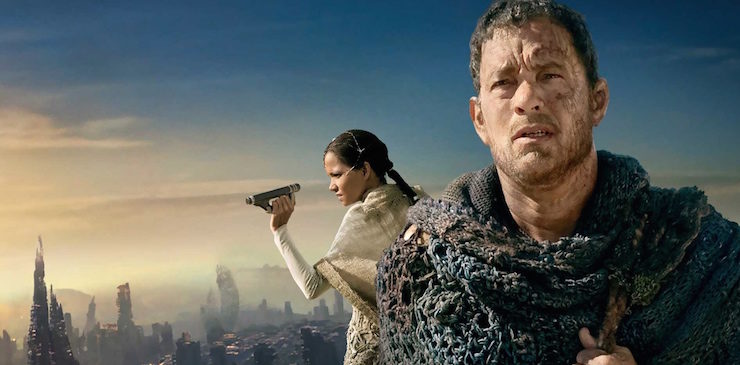I’m not sure I intended to write a novel about a connected future. I knew some of the themes I wanted to explore: our changing relationship with technology; how the future (and our humanity) might be shaped as a result; how people you know sometimes become someone else under pressure. But I didn’t set out to write a dystopian thriller necessarily—it just suddenly became that. Exploding how we live with technology nowadays a little bit into the future, and then a bit further when that technology has gone, seemed to be the best way to try to better understand our relationship with technology now.
As a result, a lot of the books I read while writing The Feed weren’t actually of this genre. Of course, I’ll take any excuse to read some Lauren Beukes or Margaret Atwood and try to work out how they create such fantastic worlds. But a lot of what I read was actually, intentionally, about connection between people: I felt that by understanding a bit more about that, I could better work out how to explore the disconnection I wanted my characters to experience in The Feed. For example, all the books by Elizabeth Strout who, in the spaces between words, conveys immense emotions; or Fates And Furies, by Lauren Groff; Ted Chiang; Tim Winton.
But at the same time, I’ve immersed myself in genre novels (and films and TV) since I could read. Sci-fi (or speculative fiction) especially has always seemed to me to be a realm where imagination can go unfettered. So I’m delighted to continue reading books like this for “work” or pure pleasure…
The Circle by Dave Eggers
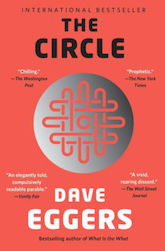 I was really worried when I first heard about this novel. As a writer, it’s a nightmare, isn’t it: not only is someone else is doing your idea, but it’s a brilliant person. And they’re publishing it sooner than you are. Actually, while there are similar themes, the worlds are completely different. But in terms of living in a connected future, that’s the heart of The Circle, and it’s a pretty dark heart at that. It’s a horror story in a way—like at the end of The Thing, when you suspect that all may not be as it seems…well here you have a lot of people who are very happy on the surface, but what’s that you see lurking in their eyes…?
I was really worried when I first heard about this novel. As a writer, it’s a nightmare, isn’t it: not only is someone else is doing your idea, but it’s a brilliant person. And they’re publishing it sooner than you are. Actually, while there are similar themes, the worlds are completely different. But in terms of living in a connected future, that’s the heart of The Circle, and it’s a pretty dark heart at that. It’s a horror story in a way—like at the end of The Thing, when you suspect that all may not be as it seems…well here you have a lot of people who are very happy on the surface, but what’s that you see lurking in their eyes…?
Ancillary Justice by Ann Leckie
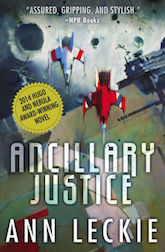 I just read Ancillary Justice by Ann Leckie, and can’t wait to read the rest of her books. It feels like one of her world-building forebears is Iain M. Banks, with his Culture novels. Again, that’s a totally different universe from The Feed, and a vast one at that. Get stuck in and enjoy: it’s wonderful SF. Tech is hugely advanced; different types of connectivity are the norm; and in every book we see a different dark aspect of this supposedly perfect society and the machinations of its members. Darkness seems to be a common thread running through my choices here. Maybe it’s something inherent in novels set in the future but commenting on our times? Anyway, these are superb novels, with the thrills of sci-fi epics, the plots of thrillers and super-connected, super-fast, super-funny AIs.
I just read Ancillary Justice by Ann Leckie, and can’t wait to read the rest of her books. It feels like one of her world-building forebears is Iain M. Banks, with his Culture novels. Again, that’s a totally different universe from The Feed, and a vast one at that. Get stuck in and enjoy: it’s wonderful SF. Tech is hugely advanced; different types of connectivity are the norm; and in every book we see a different dark aspect of this supposedly perfect society and the machinations of its members. Darkness seems to be a common thread running through my choices here. Maybe it’s something inherent in novels set in the future but commenting on our times? Anyway, these are superb novels, with the thrills of sci-fi epics, the plots of thrillers and super-connected, super-fast, super-funny AIs.
David Mitchell
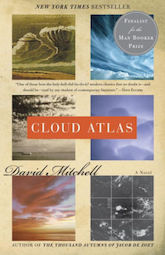 David Mitchell has written a series of novels that look at connectivity in a different way, too. Ghostwritten, Cloud Atlas, The Bone Clocks, Slade House. In a way, I don’t want to say too much about how the characters are connected in these stories because discovering that is part of the joy of them—in Ghostwritten and Cloud Atlas especially. But god they’re good. I love how Mitchell took cross-genre literature into the mainstream—not just there, but into the bestseller charts and onto the awards lists. He’s broken a lot of barriers for other writers. And in terms of connectivity, look at how all his novels connect, too. There are links between them all; it’s wonderful.
David Mitchell has written a series of novels that look at connectivity in a different way, too. Ghostwritten, Cloud Atlas, The Bone Clocks, Slade House. In a way, I don’t want to say too much about how the characters are connected in these stories because discovering that is part of the joy of them—in Ghostwritten and Cloud Atlas especially. But god they’re good. I love how Mitchell took cross-genre literature into the mainstream—not just there, but into the bestseller charts and onto the awards lists. He’s broken a lot of barriers for other writers. And in terms of connectivity, look at how all his novels connect, too. There are links between them all; it’s wonderful.
Defender by GX Todd
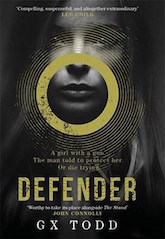 Here’s a great dystopian thriller. I read this after I finished The Feed but immediately felt we were in similar worlds. I love the beauty she finds in the brutality of the world: the factuality of both seems to be a great trait of this sort of fiction. And there’s a post-apocalyptic connectivity going on here, too…though not what you might think. It’s book one of a quadrilogy and the next—Hunter—is out soon. Very unnerving; highly recommended.
Here’s a great dystopian thriller. I read this after I finished The Feed but immediately felt we were in similar worlds. I love the beauty she finds in the brutality of the world: the factuality of both seems to be a great trait of this sort of fiction. And there’s a post-apocalyptic connectivity going on here, too…though not what you might think. It’s book one of a quadrilogy and the next—Hunter—is out soon. Very unnerving; highly recommended.
Emotional Intelligence by Daniel Goleman
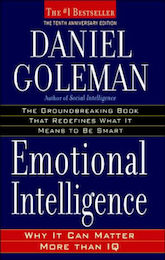 Maybe this is a funny one to have on here, but if you’ve read The Feed, you’ll know why it is. While we’re inevitably heading towards an even more connected world in terms of technology, its pace and its ubiquity, we’re also in danger of losing how we actually connect with people face-to-face. And whatever’s going on in the future, that’s a fundamental skill that is not only important but that creates meaningful relationships, brings happiness, and allows debate and development. We still do it, but for the most part not actively, often not even consciously. So here’s a book (not a novel) about good old-fashioned connectivity. It’s a very different vision for the future.
Maybe this is a funny one to have on here, but if you’ve read The Feed, you’ll know why it is. While we’re inevitably heading towards an even more connected world in terms of technology, its pace and its ubiquity, we’re also in danger of losing how we actually connect with people face-to-face. And whatever’s going on in the future, that’s a fundamental skill that is not only important but that creates meaningful relationships, brings happiness, and allows debate and development. We still do it, but for the most part not actively, often not even consciously. So here’s a book (not a novel) about good old-fashioned connectivity. It’s a very different vision for the future.
Top image: Cloud Atlas (2012)
 Nick Clark Windo was a student on the Faber Academy Writing a Novel course. He studied English Literature at Cambridge and acting at RADA, and he now works as a film producer and communications coach. Inspired by his realisation that people are becoming increasingly disconnected from one another, and questions about identity and memory, The Feed is his first thriller. He lives in London with his wife.
Nick Clark Windo was a student on the Faber Academy Writing a Novel course. He studied English Literature at Cambridge and acting at RADA, and he now works as a film producer and communications coach. Inspired by his realisation that people are becoming increasingly disconnected from one another, and questions about identity and memory, The Feed is his first thriller. He lives in London with his wife.










